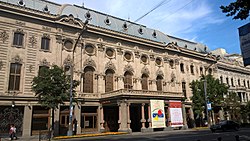The Education programs in Shota Rustaveli Theater and Georgia State Film University implement through two certified programs and three Bachelor programs.
Drama Faculty
The history of the faculty closely links with the history of the university, which established in 1923 as Institute of Performing Arts by the studio founded in 1922 by Akaki Paghava. The studio members enrolled in the institute's second year.
Among the first graduates of the institute in 1924 were A. Khorava, V. Godziashvili, T. Tsulukidze, S. Takaishvili and M. Mrevlishvili. The professors were Akaki Paghava, Kote Marjanishvili, Mikheil Koreli, Sandro Akhmeteli and Niko Shiukashvili.
Kote Marjanishvili was the artistic director of the institute. Instead of faculties, there were studios of drama and opera, and also schools of opera choir, plasticity, and rhythmic gymnastics. Lectures got delivered by I. Javakhishvili, D. Uznadze, G. Chubinashvili, A. Shanidze and others.
In 1926, the institute ceased to function. In 1927-39 only the Rustaveli Theater Studio was working.
In September 1939, the studios of Rustaveli and Marjanishvili Theaters merged with the studio of Film Fabric and the theater Institute has been restored. The members of these studios were accepted in the second, third and fourth courses of the studio.
In 1940, the Faculty of Drama Direction established in the Theater Institute.
Over the years, the department of actor's mastery and drama course was led by Akaki Khorava.
In 1956, the Institute expanded again, Music Department added to the Drama Faculty. In 1970, the Puppet Theater Actors specialization joined the Drama Faculty. Its founders were Shota Tsutsqiridze and Givi Sarchimelidze.
Since 1969, the Pantomime Theater Actor's specialty became he part of the Drama Faculty, in 1978, the Pantomime Theater Actor specialization founded under the guidance of Amiran Shalikashvili
Over the years, the department of actor's skills and stage direction was headed by D. Alexsidze, K. Pataridze.
Since 1973, the department divided, the head of Actor's department became Dmitry Alexsidze, and the head of Stage Direction department - Micheil Tumanishvili. Since 1997 the department was headed G. Jordania.
At different times the Department of Acting got led by L. Mirtskhulava, Sh. Gatserelia; the Department of Stage Speech was led by Maliko Mrevlishvili and Babulia Nikolaishvili; Heads of the Department of Stage Movement were Constantine (Kotso) Badridze and Yuri Zaretski.
At the Drama Faculty, worked: A. Vasadze, G. Tovstonogov, D. Aleksidze, A. Mikeladze, K. Pataridze, V. Kushitashvili, M. Tumanishvili, A. Dvalishvili, and others.
The older generation of directors formed the core methodological principles of education, which in its essence bases on K. Stanislavski system as a foundation for training actors.
M. Tumanishvili, who was a student of G. Tovstonogov, developed training methodology, conducted bold experiments that subsequently would make it easier for graduates which would help to adjust and adapt to the new theater groups. Thus was created the renowned Film Actors Theater.
In subsequent years on the faculty worked: Shalva Gatserelia, Gaioz Jirdania, Medea Kuchukhidze, Akvsenti Gamsakhurdia, Anzor Kutateladze, Levan Mirtskhulava, Nana Demetrashvili, Konstantine Surmava, Temur Abashidze; head of stage speech department Leila Kapanadze, head of stage movement department Natela Ionatamishvili, masters of artistic reading Zinaida Kverenchkhiladze and Guram Sagaradze and others.
Film and TV Faculty
Film and TV Faculty of Shota Rustaveli Theater and Film State University established in 1972. Despite resistance from the USSR State Committee for Cinematography, the attempts of prominent Georgian filmmakers - Rezo Chkheidze, Tengiz Abuladze, Lana Gogoberidze, Eldar Shengelaia, Otar Ioseliani was successful, and the Faculty of Filmmaking established at the Theater Institute.
The first two groups of film directors got headed by Tengiz Abuladze, Irakli Kvirikadze, Lana Gogoberidze and Omar Gvasalia.
The first graduation of students included Temur Babluani, Nana Jorjadze, Nana Janelidze, Guram Petriashvili, Goderdzi Chokheli. In 1982 Chokheli's film "Easter" won Grand Prix at the International Short Film Festival Oberhausen. [1]
Notable professors include Eldar Shengelaya, Giorgi Shengelaia, Otar Ioseliani, Rezo Esadze, Soso Chkhaidze, Gela Kandelaki.
Famous directors who were former students at the university: Dito Tsintsadze, Tato Kotetishvili, Aleko Tsabadze, Levan Tutberidze, David Janelidze, David Sikharulidze, David Takaishvili, Lado Sulakvelidze.

